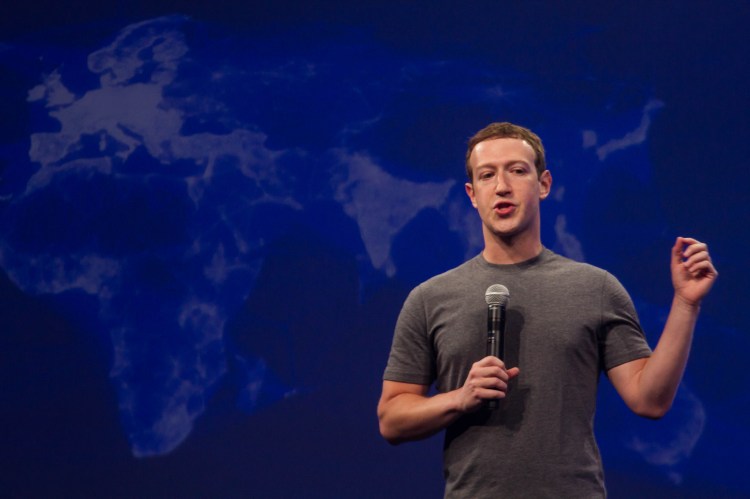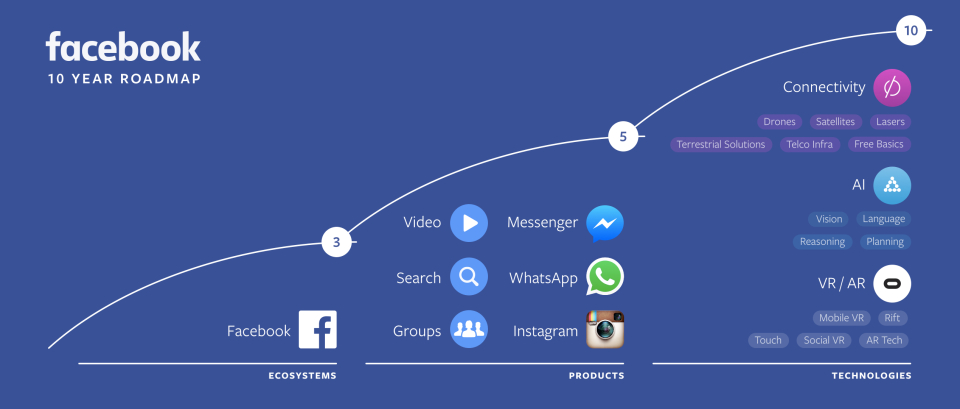Mark Zuckerberg believes that augmented reality will play an important role in building communities. While the camera has become the center of many of Facebook’s apps, especially as it continues to cannibalize Snapchat, the Facebook chief executive believes there’s more that can be done and stated his intention to have a platform for developers to build on.
“We’re making the camera the first augmented reality platform,” he proclaimed on stage at the company’s F8 developer conference, explaining that the platform is launching today in closed beta with the basic effects you’re used to: face makes, style transfers, and effects. He hinted that soon you’ll be able to create your own artwork and eventually have thousands to choose from.
Zuckerberg elaborated about future technological advances such as 3D effects, simultaneous location and mapping to determine precise location, facial detection, and a scripting API that can be used to import data from third-party services. It will take a while to develop, he cautioned, saying that your experience won’t change “overnight” and that this will be an important technology that changes how we use our phones.
All of this talk around augmented reality shouldn’t be surprising, because it’s part of Facebook’s 10-year road map. He believes this technology “will free us for the things we care about. In the future, more of us will contribute to culture and society that’s not measured by traditional economics and GDP.”
June 5th: The AI Audit in NYC
Join us next week in NYC to engage with top executive leaders, delving into strategies for auditing AI models to ensure fairness, optimal performance, and ethical compliance across diverse organizations. Secure your attendance for this exclusive invite-only event.
He continued to say that augmented reality “makes it so that we can make things that were today limited to the digital world.”
Act 2: The launch of a camera effects platform
Millions of people are exposed to this technology across the host of Facebook apps, including Instagram, Messenger, and its flagship app. It’s those features that the company has copied from Snapchat, which executives like Kevin Systrom have acknowledged that the ephemeral messaging app pioneered. But that’s only one part of Facebook’s strategy and the launch of a platform around camera effects is the second act.
With the release of the camera effects platform, developers can tap into the frame studio and is available today globally. “This new content type brings AR to everyday life,” said Deb Liu, Facebook’s vice president of platform and marketplace. “Artists and creators can create so much more.”
Facebook has also launched AR Studio, a way to let you create animated 3D masks with face tracking, scripting, data integration, 3D rendering, support for front and back camera, and device motion. You can experience the game in augmented reality.
You’ll soon be able to use Giphy GIFs within Facebook Live too, developed through AR Studio.
“The journey to augmented reality is 1 percent finished,” Liu remarked.
See also: Facebook is launching augmented reality game platform later this year
Part of the roadmap
Now in its 13th year, Facebook has held just 10 developer conferences, and this is one of the largest in its history, with 4,000 people said to be in attendance. A lot has changed since the company began holding an event to boost its reputation with developers. While new products have emerged each year, Facebook’s focus has evolved, moving from a simple social network to being something ingrained in practically every part of our daily lives — more than a quarter of the world’s population use it every month.
Previously, Zuckerberg has talked about the 10-year road map he sees for his company, shifting from ecosystems to products and building out technologies to improve our lives, connect more of the world, and discover the next frontier of technology. While developers and investors will look to the Facebook CEO for guidance on where the company’s heading, there are others who wonder how he’ll deal with the growth problems.
Recognizing the evolution of his company, Zuckerberg recently penned a 6,000 treatise about how the community has grown since Facebook first started its mission of bringing the world closer together. On stage, he spoke about his drive to bring people together while also supporting differing opinions. “This is an important time to build community,” Zuckerberg said. “We have a lot of work to bring people together. … I think the bigger part of the solution is social as well.”
But it’s not business as usual for Facebook, and the company’s CEO reminded those in attendance about the heavy burden that it faces: “We have a lot more to do here, and we’re reminded of this by the tragedy in Cleveland. We have a lot of work, and we’re going to keep doing all we can to keep tragedies like this from happening.”



